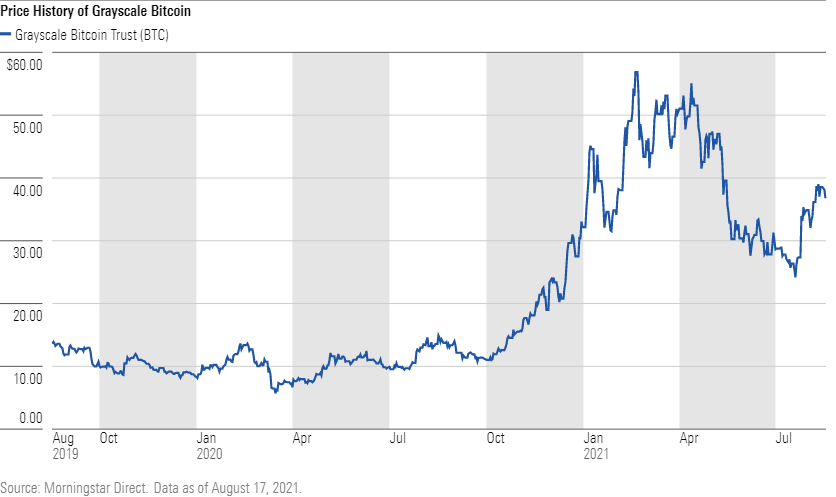What Do Fund Managers Really Think of Cryptocurrency?
Are they looking at it with open eyes or giving it the side eye?

Cryptocurrencies’ rapid rise has gained the attention of some large investment shops. Several Morgan Stanley funds can now invest in the volatile and controversial digital money through cash-settled futures or funds like Grayscale Bitcoin Trust GBTC. Fidelity also launched a bitcoin fund for qualified investors, and its bitcoin exchange-traded fund for a wider audience awaits regulatory approval. More ways to invest in cryptocurrencies are sure to come. But should you invest? Morningstar analysts recently surveyed some equity managers that we cover for their thoughts.

The Skeptics
Some bottom-up fundamental stock-pickers regard cryptocurrencies as speculation tools. Diamond Hill Large Cap DHLRX manager Austin Hawley said that this seems to be the way most people use them. He doesn’t see a compelling, long-term investment case for them now largely because, unlike traditional stocks or bonds, digital currencies don’t produce cash flows, which makes determining their intrinsic value difficult.
Hawley’s colleagues at Diamond Hill Small Cap DHSIX also had reservations; comanager Aaron Monroe has tried to learn about crypto but has not invested in it directly or indirectly. “I do not want to put capital in something I can’t make heads or tales of,” he said. The fund’s senior manager, Chris Welch, doubts economies will adopt crypto widely for transactions because of tax and liquidity issues.
Arman Gokgol-Kline and Trevor Magyar, members of Sequoia Fund’s SEQUX investment committee, are interested in the role cryptocurrencies might play in the future, but without fundamentals to assess, it’s hard to invest without making a macro-related bet, which they try to avoid. At this point, cryptocurrencies are more of a coffee-chat topic for them rather than an investable idea.
The Observers
Champlain Investment Partners’ CIO Scott Brayman, who leads the firm’s small- and mid-growth strategies, is open-minded but cautious. “Things that seem outrageous today can become normalized over time,” he said. Blockchain technology, for instance, can have more uses then currently imagined. However, direct investing in cryptocurrencies is not suitable for Brayman’s risk-averse approach. In fact, he said he’d sell a portfolio holding that put bitcoin, or any other volatile cryptocurrency, on its balance sheet.
Others watch crypto to see how it might impact their portfolios. Janus Henderson Enterprise JMGRX comanagers Brian Demain and Cody Wheaton don’t see many investable opportunities but are on the lookout for how blockchain technology might disrupt or inspire their current holdings to adapt. Broadridge BR, a provider of communication and technology services to financial companies, for example, has made several minority investments in and small acquisitions of companies with blockchain and cryptocurrency exposure. The managers also have been researching Ethereum, a more flexible and environmentally friendly alternative to bitcoin that may have a better chance at becoming a store of value, Demain contends.
Matt Dennis, comanager of Invesco International Growth AIIEX, also thinks Ethereum has more potential than bitcoin. He says it has more uses and concedes that there’s clear demand for alternative stores of value. But in general, he is more interested in blockchain technology than in cryptocurrencies themselves, saying there's a lot going on behind the scenes with blockchain that shouldn't be dismissed just because of the well-documented volatility and perhaps-excessive enthusiasm surrounding bitcoin. He doesn’t own any cryptocurrencies in his fund and doesn’t plan to.
Willing and Able
Morgan Stanley’s Counterpoint Global funds, known for their focus on disruptive change, started investing in cryptocurrency in 2021. Morgan Stanley Institutional Growth MSEQX and Morgan Stanley Institutional Advantage MPAIX each held a 0.33% position in the Grayscale Bitcoin Trust as of June 30, and Morgan Stanley Institutional Discovery MPEGX owned 0.36%, in line with lead manager Dennis Lynch’s plan for at-cost positions under 1% of assets. Lynch thinks position sizing could control for crypto-related investments’ risks, though their extreme volatility may make that tricky. Morgan Stanley Institutional Growth also has indirect cryptocurrency exposure through payment processor Square SQ, a top holding that had about 5% of its total assets in bitcoin as of year-end 2020. The firm’s earnings took a hit in 2021’s second quarter as bitcoin’s price tumbled, highlighting the risks involved.
Emerald Banking and Finance HSSIX has the largest direct cryptocurrency exposure of any fund under Morningstar’s coverage. Grayscale Bitcoin Trust and Grayscale Ethereum Trust ETHE accounted for 2.1% of assets in total as of June 2021. The stake was even higher earlier in the year--almost 5.0%. Managers Ken Mertz and Steven Russell say there’s value in buying these private funds at discounts to their net asset values. They also have at least 11% of indirect cryptocurrency exposure through trading platforms Voyager Digital VYGR and Coinbase COIN; asset managers Galaxy Digital Holdings GLXY and DeFi Technologies DEFTF; and bitcoin mining firm Riot Blockchain RIOT. The appearance of cryptocurrency in the fund coincided with digital currencies’ recent volatile runup and is relatively new for the strategy; it has typically focused on regional banks, which have struggled in recent years.
Accidental Crypto Investor
Cryptocurrency was not part of Royce Total Return RTRIX manager Miles Lewis’ thesis for liking New York-based Signature Bank SBNY. The former American Century Small Cap Value ACVIX manager, who joined Royce in 2020, saw a unique, growing regional bank trading at low valuations because of concerns about the pandemic, interest rates, and other issues. The stock has surged in the past year, though, as it has become a leading deposit-taker for digital currency customers. It was the strategy’s top positive contributor to performance in the year ended July 31, 2021, but Lewis says he still has no opinion on cryptocurrency because it is hard to value. He does think blockchain technology may have interesting implications, though.
If, or when, crypto does insinuate itself into more businesses, exposure to it in equity funds may become less incidental.

/s3.amazonaws.com/arc-authors/morningstar/c68a6746-dc31-465f-b144-7ec565088c67.jpg)
/cloudfront-us-east-1.images.arcpublishing.com/morningstar/HTLB322SBJCLTLWYSDCTESUQZI.png)
/cloudfront-us-east-1.images.arcpublishing.com/morningstar/TAIQTNFTKRDL7JUP4N4CX7SDKI.png)
:quality(80)/s3.amazonaws.com/arc-authors/morningstar/c68a6746-dc31-465f-b144-7ec565088c67.jpg)